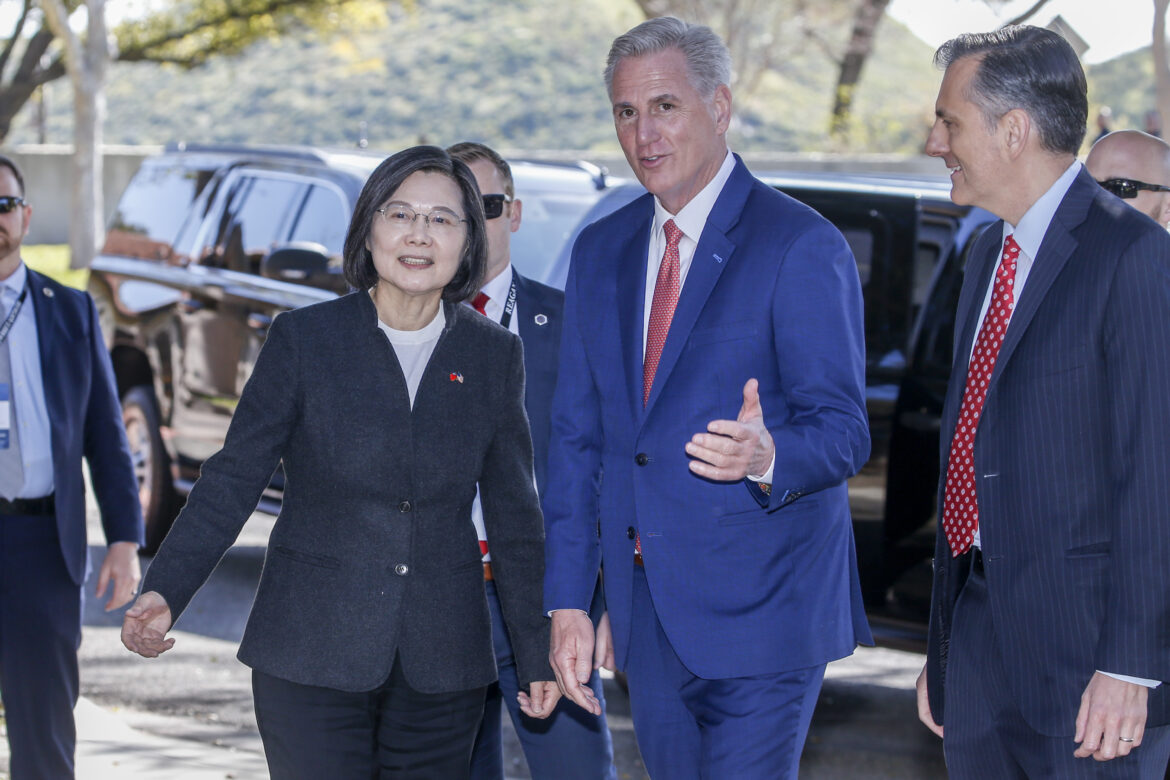Chinese protests as Taiwan president meets top US politician
Risking China’s anger, US House Speaker Kevin McCarthy has hosted Taiwan President Tsai Ing-wen as a “great friend of America” in a fraught show of American support at a rare high-level, bipartisan meeting on American soil.
Speaking carefully to avoid unnecessarily escalating tensions with Beijing, Tsai and McCarthy steered clear of calls from hard-liners in the US for a more confrontational stance toward China in defence of self-ruled Taiwan.
Instead, the two leaders stood side by side on Wednesday in a show of unity at the Ronald Reagan Presidential Library in California, acknowledging China’s threats against the island government but speaking only of maintaining longstanding US policy.

“America’s support for the people of Taiwan will remain resolute, unwavering and bipartisan,” McCarthy said at a press conference later.
McCarthy evoked Reagan’s peace-through-strength approach to foreign relations and emphasised that “this is a bipartisan meeting of members of Congress,” not any one political party. He said U.S.-Taiwan ties are stronger than at any other point in his life.
Later on Wednesday, China said it “firmly opposes and strongly condemns Tsai’s visit”.
Also on Wednesday, Taiwan’s Ministry of National Defence said it had tracked the Chinese Army’s Shandong aircraft carrier passing through the Bashi Strait, to Taiwan’s southeast.
It was part of a joint patrol and inspection operation in the central and northern waters of the Taiwan Strait, Chinese state media said.
In California, Tsai spoke to reporters with former US president Ronald Reagan’s Air Force One jet as a backdrop.
She said the “unwavering support reassures the people of Taiwan that we are not isolated.”
Still, the formal trappings of the meeting, and the senior rank of some of the elected officials in the delegation from Congress, threatened to run afoul of China’s position that any interaction between US and Taiwanese officials is a challenge to China’s claim of sovereignty over the island.

More than a dozen Democratic and Republican politicians, including the House’s third-ranking Democrat, joined Republican McCarthy for the day-long talks.
During a private session they spoke of the importance of Taiwan’s self-defence, of fostering robust trade and economic ties and supporting the island government’s ability to participate in the international community, Tsai said.
They made no mention of calls from hard-liners in and out of Congress for a greater US commitment to Taiwan’s defence if China should attack.
Tsai said she stressed to legislators Taiwan’s commitment “to defending the peaceful status quo where the people in Taiwan may continue to thrive in a free and open society.”
But she also warned, “It is no secret that today the peace that we have maintained and the democracy which have worked hard to build are facing unprecedented challenges.”
“We once again find ourselves in a world where democracy is under threat and the urgency of keeping the beacon of freedom shining cannot be understated.”

The United States broke off official ties with Taiwan in 1979 while formally establishing diplomatic relations with the Beijing government.
The US acknowledges a “one-China” policy in which Beijing lays claim to Taiwan, but it does not endorse China’s claim to the island and remains Taiwan’s key provider of military and defence assistance.
For Tsai, this was the most sensitive stop on a weeklong journey meant to shore up alliances with the US and Central America. No speaker is known to have met with a Taiwan president on American soil since the US broke off formal diplomatic relations.
China has reacted to past trips by Taiwanese presidents through the US, and to past trips to Taiwan by senior US officials, with shows of military force. After then-house speaker Nancy Pelosi to Taiwan last August, the Chinese military responded with its largest live-fire drills in decades, including firing a missile over the island.
Chinese officials have pledged a sharp but unspecified response to the meeting with McCarthy.

On Wednesday, China said it “will take “resolute and forceful measures to defend national sovereignty and territorial integrity”. It urged the US “not to walk further down the wrong and dangerous road.”
The Biden administration insists there is nothing provocative about this visit by Tsai.








